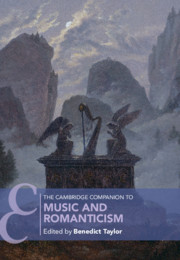Book contents
- The Cambridge Companion to Music and Romanticism
- Cambridge Companions to Music
- The Cambridge Companion to Music and Romanticism
- Copyright page
- Contents
- Figures
- Tables
- Musical Examples
- Contributors
- Preface
- Chronology
- Part I Horizons
- Part II Worlds
- Part III Aesthetics
- Part IV Practices
- Part V Histories
- 19 Musical Romanticism as a Historiographical Construct
- 20 The End(s) of Musical Romanticism
- Select Bibliography
- Index
- References
19 - Musical Romanticism as a Historiographical Construct
from Part V - Histories
Published online by Cambridge University Press: 06 August 2021
- The Cambridge Companion to Music and Romanticism
- Cambridge Companions to Music
- The Cambridge Companion to Music and Romanticism
- Copyright page
- Contents
- Figures
- Tables
- Musical Examples
- Contributors
- Preface
- Chronology
- Part I Horizons
- Part II Worlds
- Part III Aesthetics
- Part IV Practices
- Part V Histories
- 19 Musical Romanticism as a Historiographical Construct
- 20 The End(s) of Musical Romanticism
- Select Bibliography
- Index
- References
Summary
This chapter explores musical Romanticism as a historiographical concept. Drawing on a range of sources, from nineteenth-century writings to textbooks published in the twentieth century, it probes the distinction that has been made between classicism and Romanticism, noting that it is only when musical Romanticism is over that the concept of a Romantic era starts being crystallised. It investigates the degree to which the year 1848 can be considered to be a symbolic moment for the end of Romanticism and, through the music of the second half of the nineteenth century, considers the relationship between musical Romanticism and closely related concepts such as neo-Romanticism, realism, and modernity. Drawing on a wide range of historiographical writings from the second half of the twentieth century, it explores changing conceptions of where musical Romanticism is deemed to reside, whether in instrumental music or vocal music, and whether within the Germanic realm or beyond it. It investigates the place and role of women within musical Romanticism and explores their absence in writings on musical Romanticism in relation to broader writings on Romanticism and feminism.
Keywords
- Type
- Chapter
- Information
- The Cambridge Companion to Music and Romanticism , pp. 327 - 342Publisher: Cambridge University PressPrint publication year: 2021



